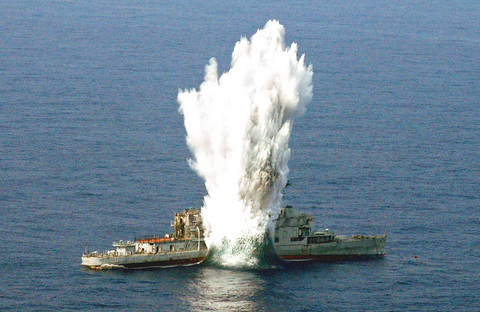After a 12-minute journey, a torpedo launched from a Jianlong-class submarine hit its target ship yesterday, and officials at the Kaohsiung naval base hailed the drill as a success.
"The live drill proved that submarines are an effective and useful force, and the navy hopes that it can quickly establish an advanced submarine force," naval chief of operations Chen Pan-chih (陳邦治) said yesterday.
The drill was conducted in waters off Hsiao Liuchiu (小琉球), an island off the southwest coast. The Jianlong-class submarine launched the torpedo at 9am and hit the target in a violent plume of water. Chen and the other officials cheered as the torpedo hit the target.

PHOTO: AP
A half hour later, the smoking ship slowly sank.
The Navy broadcast the drill live at the Kaohsiung base. Chen admitted that he and naval officials were under pressure because variables in the sea environment might have affected the torpedo's path.
The navy has fired submarine-launched torpedoes five times in the last two years. Three of them hit the targets.
Chen said yesterday's drill used a large, wire-guided torpedo costing NT$100 million (US$3.2 million).
He then called for the formation of an advanced submarine force to deter China from engaging in a war.
Chen said that if China's submarines blockaded Taiwan's harbors and sea lanes, Taiwanese submarines would be able to counter-blockade in kind along the coast and in major harbors.
He said the currently stalled arms-procurement bill would, if passed, greatly increase the cost and risks for China if it attempted to start a war with Taiwan.

US President Donald Trump yesterday announced sweeping "reciprocal tariffs" on US trading partners, including a 32 percent tax on goods from Taiwan that is set to take effect on Wednesday. At a Rose Garden event, Trump declared a 10 percent baseline tax on imports from all countries, with the White House saying it would take effect on Saturday. Countries with larger trade surpluses with the US would face higher duties beginning on Wednesday, including Taiwan (32 percent), China (34 percent), Japan (24 percent), South Korea (25 percent), Vietnam (46 percent) and Thailand (36 percent). Canada and Mexico, the two largest US trading

AIR SUPPORT: The Ministry of National Defense thanked the US for the delivery, adding that it was an indicator of the White House’s commitment to the Taiwan Relations Act Deputy Minister of National Defense Po Horng-huei (柏鴻輝) and Representative to the US Alexander Yui on Friday attended a delivery ceremony for the first of Taiwan’s long-awaited 66 F-16C/D Block 70 jets at a Lockheed Martin Corp factory in Greenville, South Carolina. “We are so proud to be the global home of the F-16 and to support Taiwan’s air defense capabilities,” US Representative William Timmons wrote on X, alongside a photograph of Taiwanese and US officials at the event. The F-16C/D Block 70 jets Taiwan ordered have the same capabilities as aircraft that had been upgraded to F-16Vs. The batch of Lockheed Martin

GRIDLOCK: The National Fire Agency’s Special Search and Rescue team is on standby to travel to the countries to help out with the rescue effort A powerful earthquake rocked Myanmar and neighboring Thailand yesterday, killing at least three people in Bangkok and burying dozens when a high-rise building under construction collapsed. Footage shared on social media from Myanmar’s second-largest city showed widespread destruction, raising fears that many were trapped under the rubble or killed. The magnitude 7.7 earthquake, with an epicenter near Mandalay in Myanmar, struck at midday and was followed by a strong magnitude 6.4 aftershock. The extent of death, injury and destruction — especially in Myanmar, which is embroiled in a civil war and where information is tightly controlled at the best of times —

China's military today said it began joint army, navy and rocket force exercises around Taiwan to "serve as a stern warning and powerful deterrent against Taiwanese independence," calling President William Lai (賴清德) a "parasite." The exercises come after Lai called Beijing a "foreign hostile force" last month. More than 10 Chinese military ships approached close to Taiwan's 24 nautical mile (44.4km) contiguous zone this morning and Taiwan sent its own warships to respond, two senior Taiwanese officials said. Taiwan has not yet detected any live fire by the Chinese military so far, one of the officials said. The drills took place after US Secretary